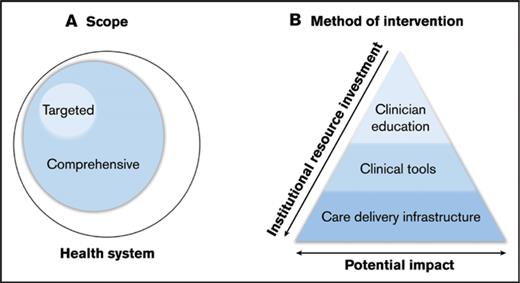Name: Systems-Based Hematology (SBH) Working Group, which reports to the Subcommittee on Stewardship and Systems-Based Hematology (SSSBH)
Chairs: Marc S. Zumberg, MD, working group; Ming Y. Lim, MBBChir, subcommittee
Mandate: “The Subcommittee on Stewardship and Systems-Based Hematology, a subcommittee of the Committee on Quality, coordinates the development of sessions, programs, educational materials, publications, and other activities designed to further ASH’s goal of encouraging stewardship of resources, enhancing patient safety, and promoting the concept of ‘systems-based hematology’ as a viable career path for hematologists.”
For More Info:hematology.org/about/governance/standing-committees/stewardship-systems-based-hematology
In the 21st century, health care systems are challenged with meeting the growing needs of an increasing number of patients with chronic diseases. To deliver high-quality and cost-effective care, systems must evolve and optimize continuously. Hematologic care transcends many medical and surgical specialties, and hematologists are in a unique position to “optimally contribute to the emerging 21st-century health ecosystem.”1,2 In 2015, within this background and on behalf of ASH, Paul J. Wallace, MD, Nathan T. Connell, MD, MPH, and Janis L. Abkowitz, MD, proposed a career pathway for hematologists, termed “Systems-based Hematology (SBH).”1 A systems-based hematologist is defined as a specialty-trained physician employed by a hospital, medical center, or health system who focuses on optimizing individual patient care, as well as the overall system of health care delivery for patients with blood disorders.1 The SBH pathway aims to provide enhanced career opportunities for classical and malignant hematologists and to increase the impact hematologists have on patient care and health care delivery.1
Systems-based hematologists help define and develop pathways for delivering high-quality, cost-effective, evidence-based care to patients with blood disorders.2 This coordinated and consistent care is delivered across a variety of specialties and care settings, typically requiring multidisciplinary collaborations. In 2020, Jori E. May, MD, and colleagues published an update on SBH in Blood Advances, which categorized the scope of SBH projects into those that are targeted (e.g., heparin-induced thrombocytopenia, thrombophilia testing) and those that are comprehensive (e.g., anticoagulation stewardship programs, blood product utilization).2 Furthermore, the method of intervention was broken down according to the level of resource investment required for the project and its potential impact (Figure),2 and the authors provided a summary of successful initiatives that highlight the principles of SBH based on their scope and method of intervention.2 While these initiatives often yield immediate improvement following implementation, maintenance and widespread adoption can be a struggle. Systems-based hematologists play a critical role in the sustainability of successful initiatives and iteratively improve upon them to deliver high-quality and efficient care.
Classification of systems-based initiatives. Classification by scope (A) and method of intervention (B). May JE, Irelan PC, Boedeker K, et al. Systems-based hematology: highlighting successes and next steps. Blood Adv. 2020;4(18):4574-4583.
Classification of systems-based initiatives. Classification by scope (A) and method of intervention (B). May JE, Irelan PC, Boedeker K, et al. Systems-based hematology: highlighting successes and next steps. Blood Adv. 2020;4(18):4574-4583.
We are living in an exciting era of drug development accompanied by a rapid evolution of practice, which has also led to an escalating financial impact on clinical care, highlighting the need for continued investment in SBH to ensure the delivery of evidence-driven, cost-effective care. Many institutions have begun to recognize the value of SBH for delivering such care, providing partial salary support to systems-based hematologists to pursue initiatives that enhance patient care throughout the health care system. Similarly, academic departments have hired hematologists whose career pathways are focused on SBH, rather than traditional research or clinical practice. Concurrently, ASH has played an important role in generating trainee interest by promoting SBH as a career pathway during the ASH-a-Palooza and Career Development Lunch Sessions, as well as during the SBH Education and Networking session at the ASH annual meeting. Through these sessions, we, along with members of the Subcommittee, have made ourselves available to trainees and junior faculty members for mentoring outside our institutions, aiming to expand the field of SBH and to advocate for their role as systems-based hematologists.
In summary, since its introduction in 2015, the role of the SBH has gained broader acceptance throughout the health care system. With the continued support of ASH and interest from our membership, the SBH Working Group will continue to make significant contributions to the care of individual patients and aid in defining and developing pathways for the delivery of high-quality, cost-effective, evidence-based care to patients with blood disorders.
Competing Interests
Dr. Zumberg receives partial salary support from Shands Hospital at the University of Florida and from the Department of Anesthesia (UF Health) for his role as a systems-based hematologist. Drs. Shah and Lim indicated no relevant conflicts of interest.

